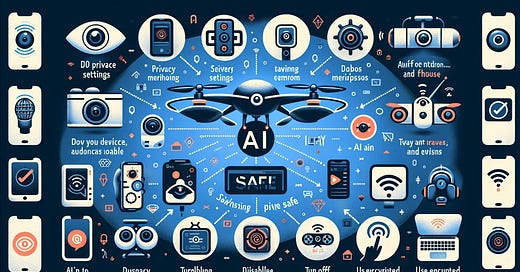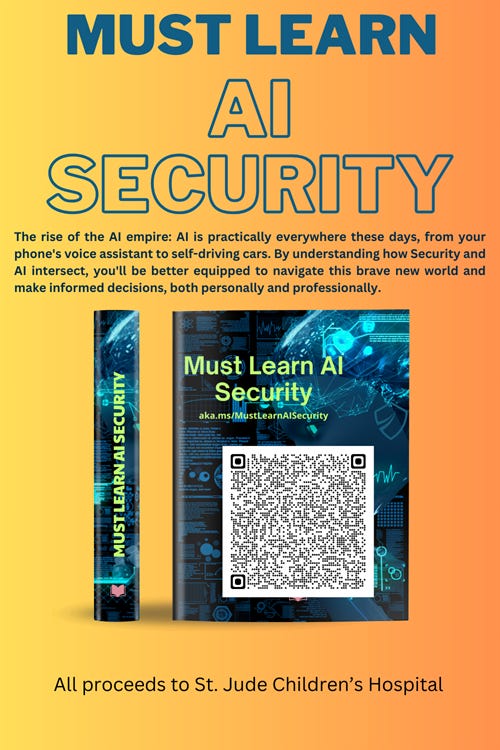Artificial intelligence (AI) is transforming the world in many ways, from automating tasks to enhancing creativity. But as AI becomes more integrated with devices such as cell phones, laptops, smart speakers, and cameras, there are also potential dangers that you need to be aware of. In this blog post, I’ll discuss some of the risks that AI poses to privacy, security, and well-being, and how to protect ourselves from them.
Privacy
One of the main concerns that AI raises is the invasion of our privacy. AI can collect, analyze, and use our personal data without our consent or knowledge. For example, AI can track our location, browsing history, online behavior, preferences, and even emotions through our devices. AI can also use facial recognition, voice recognition, and biometric data to identify us and access our information. This can lead to unwanted targeted advertising, profiling, discrimination, or even identity theft.
How can we protect our privacy from AI? Here are some tips:
Use strong passwords and encryption for your devices and accounts.
Turn off or limit the access of AI features such as Siri, Alexa, Google Assistant, or Cortana to your microphone, camera, or location.
Review and adjust the privacy settings of your apps and services and opt out of data collection or sharing whenever possible.
Identify and review the specific AI’s data usage policies. For example, Google says it won’t use personal data to train its AI models: https://cloud.google.com/document-ai/docs/security
Use VPNs, ad blockers, and anti-tracking tools to prevent third-party tracking and surveillance.
Be careful about what you post, share, or upload online, and avoid clicking on suspicious links or attachments.
Security
Another risk that AI poses is the compromise of our security. AI can be used by hackers, cybercriminals, or malicious actors to launch sophisticated attacks on our devices, networks, or systems. For example, AI can create fake or deepfake content, such as images, videos, or audio, that can deceive, manipulate, or blackmail us. AI can also use phishing, spamming, or social engineering techniques to trick us into revealing our passwords, personal information, or financial details. AI can also exploit vulnerabilities, bypass security measures, or take control of our devices or systems.
How can we protect our security from AI? Here are some tips:
Keep your devices and software updated with the latest patches and security updates.
Use antivirus, firewall, and anti-malware software to detect and prevent malicious attacks.
Verify the source and authenticity of the content that you receive or consume, and do not trust everything that you see or hear online.
Be wary of unsolicited or unexpected messages, calls, or emails, and do not respond to them or click on any links or attachments.
Use two-factor authentication, biometric authentication, or password managers to secure your accounts and devices.
Well-being
A final danger that AI poses is the impact on our well-being. AI can affect our mental, emotional, and physical health in various ways. For example, AI can create stress, anxiety, or depression by increasing our workload, expectations, or pressure. AI can also reduce our social skills, empathy, or creativity by replacing human interaction, communication, or expression. AI can also harm our physical health by exposing us to radiation, noise, or pollution, or by encouraging sedentary or unhealthy habits.
How can we protect our well-being from AI? Here are some tips:
Set boundaries and limits for your use of AI devices and services and take breaks from them regularly.
Balance your online and offline activities, and engage in hobbies, sports, or leisure that do not involve AI.
Maintain your social and emotional connections with your family, friends, or community, and seek support when you need it.
Express your feelings, thoughts, or opinions through art, music, writing, or other forms of creativity.
Take care of your physical health by eating well, sleeping well, exercising, and avoiding substance abuse.
Conclusion
AI is a powerful and beneficial technology that can improve our lives in many ways. But it also comes with potential dangers that we need to be aware of and prepared for. By following the tips, you can protect privacy, security, and well-being from AI, and enjoy its advantages without compromising rights, values, or dignity.
[Want to discuss this further? Hit me up on Twitter or LinkedIn]
[Subscribe to the RSS feed for this blog]
[Subscribe to the Weekly Microsoft Sentinel Newsletter]
[Subscribe to the Weekly Microsoft Defender Newsletter]
[Subscribe to the Weekly Azure OpenAI Newsletter]
[Learn KQL with the Must Learn KQL series and book]
[Learn AI Security with the Must Learn AI Security series and book]





